MBA401: Reflective Journal - My Leadership Journey and Future Goals
VerifiedAdded on 2023/03/17
|6
|2764
|89
Journal and Reflective Writing
AI Summary
This reflective journal delves into the author's personal journey of self-discovery as a leader, exploring their leadership style, strengths, and areas for improvement. Drawing from childhood experiences, academic literature, and course materials, the author reflects on their understanding of leadership, emotional intelligence, and the importance of building strong relationships. The journal analyzes the author's GEIT scores, highlighting the need for improved social awareness and empathy. It also discusses the significance of creating a safe and collaborative environment for followers. The author identifies key takeaways, including the value of standing up for others, passion for work, and continuous self-improvement, and concludes by emphasizing the importance of self-awareness in understanding their leadership potential. This assignment, available on Desklib, provides valuable insights into the author's personal leadership journey and future aspirations.
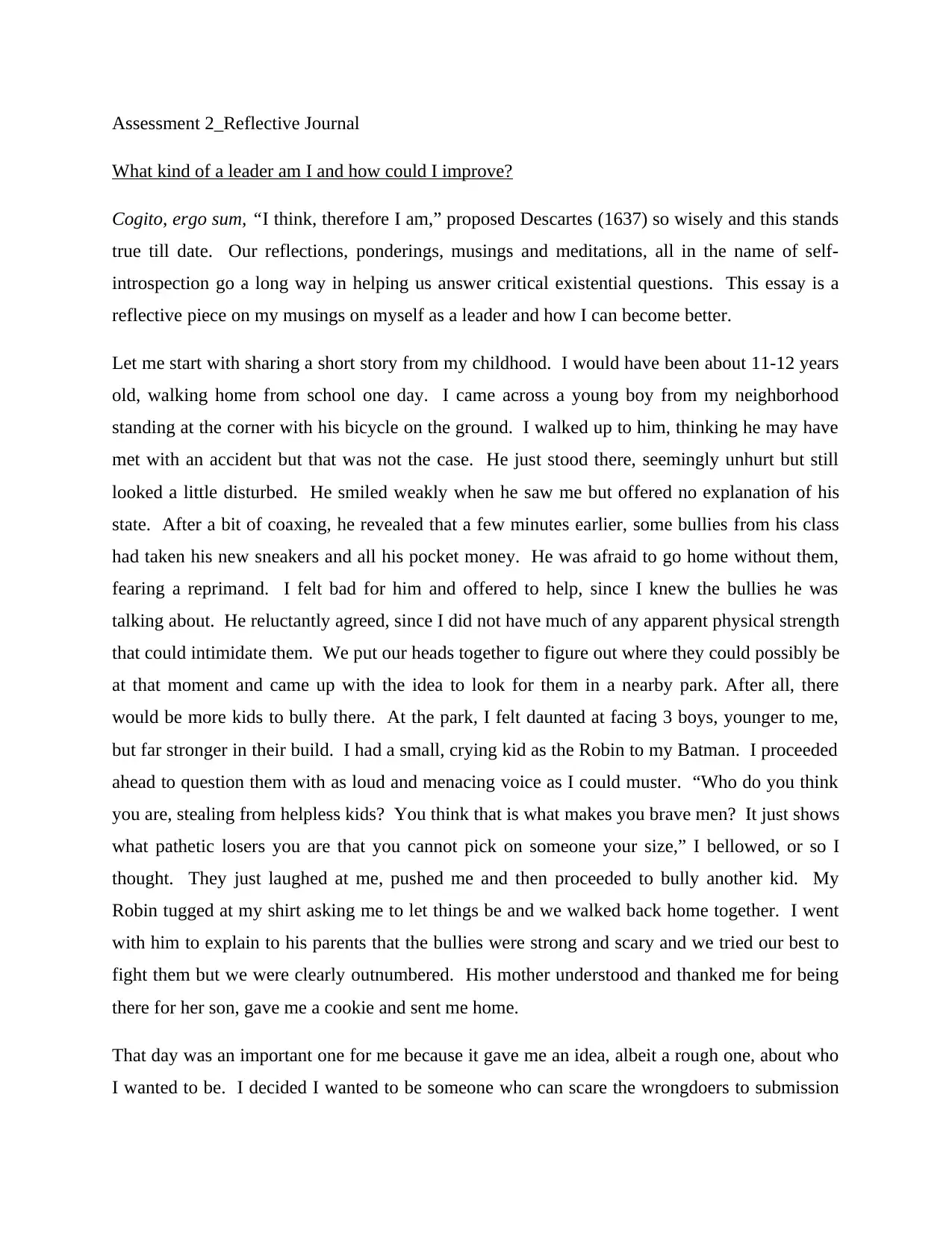
Assessment 2_Reflective Journal
What kind of a leader am I and how could I improve?
Cogito, ergo sum, “I think, therefore I am,” proposed Descartes (1637) so wisely and this stands
true till date. Our reflections, ponderings, musings and meditations, all in the name of self-
introspection go a long way in helping us answer critical existential questions. This essay is a
reflective piece on my musings on myself as a leader and how I can become better.
Let me start with sharing a short story from my childhood. I would have been about 11-12 years
old, walking home from school one day. I came across a young boy from my neighborhood
standing at the corner with his bicycle on the ground. I walked up to him, thinking he may have
met with an accident but that was not the case. He just stood there, seemingly unhurt but still
looked a little disturbed. He smiled weakly when he saw me but offered no explanation of his
state. After a bit of coaxing, he revealed that a few minutes earlier, some bullies from his class
had taken his new sneakers and all his pocket money. He was afraid to go home without them,
fearing a reprimand. I felt bad for him and offered to help, since I knew the bullies he was
talking about. He reluctantly agreed, since I did not have much of any apparent physical strength
that could intimidate them. We put our heads together to figure out where they could possibly be
at that moment and came up with the idea to look for them in a nearby park. After all, there
would be more kids to bully there. At the park, I felt daunted at facing 3 boys, younger to me,
but far stronger in their build. I had a small, crying kid as the Robin to my Batman. I proceeded
ahead to question them with as loud and menacing voice as I could muster. “Who do you think
you are, stealing from helpless kids? You think that is what makes you brave men? It just shows
what pathetic losers you are that you cannot pick on someone your size,” I bellowed, or so I
thought. They just laughed at me, pushed me and then proceeded to bully another kid. My
Robin tugged at my shirt asking me to let things be and we walked back home together. I went
with him to explain to his parents that the bullies were strong and scary and we tried our best to
fight them but we were clearly outnumbered. His mother understood and thanked me for being
there for her son, gave me a cookie and sent me home.
That day was an important one for me because it gave me an idea, albeit a rough one, about who
I wanted to be. I decided I wanted to be someone who can scare the wrongdoers to submission
What kind of a leader am I and how could I improve?
Cogito, ergo sum, “I think, therefore I am,” proposed Descartes (1637) so wisely and this stands
true till date. Our reflections, ponderings, musings and meditations, all in the name of self-
introspection go a long way in helping us answer critical existential questions. This essay is a
reflective piece on my musings on myself as a leader and how I can become better.
Let me start with sharing a short story from my childhood. I would have been about 11-12 years
old, walking home from school one day. I came across a young boy from my neighborhood
standing at the corner with his bicycle on the ground. I walked up to him, thinking he may have
met with an accident but that was not the case. He just stood there, seemingly unhurt but still
looked a little disturbed. He smiled weakly when he saw me but offered no explanation of his
state. After a bit of coaxing, he revealed that a few minutes earlier, some bullies from his class
had taken his new sneakers and all his pocket money. He was afraid to go home without them,
fearing a reprimand. I felt bad for him and offered to help, since I knew the bullies he was
talking about. He reluctantly agreed, since I did not have much of any apparent physical strength
that could intimidate them. We put our heads together to figure out where they could possibly be
at that moment and came up with the idea to look for them in a nearby park. After all, there
would be more kids to bully there. At the park, I felt daunted at facing 3 boys, younger to me,
but far stronger in their build. I had a small, crying kid as the Robin to my Batman. I proceeded
ahead to question them with as loud and menacing voice as I could muster. “Who do you think
you are, stealing from helpless kids? You think that is what makes you brave men? It just shows
what pathetic losers you are that you cannot pick on someone your size,” I bellowed, or so I
thought. They just laughed at me, pushed me and then proceeded to bully another kid. My
Robin tugged at my shirt asking me to let things be and we walked back home together. I went
with him to explain to his parents that the bullies were strong and scary and we tried our best to
fight them but we were clearly outnumbered. His mother understood and thanked me for being
there for her son, gave me a cookie and sent me home.
That day was an important one for me because it gave me an idea, albeit a rough one, about who
I wanted to be. I decided I wanted to be someone who can scare the wrongdoers to submission
Paraphrase This Document
Need a fresh take? Get an instant paraphrase of this document with our AI Paraphraser
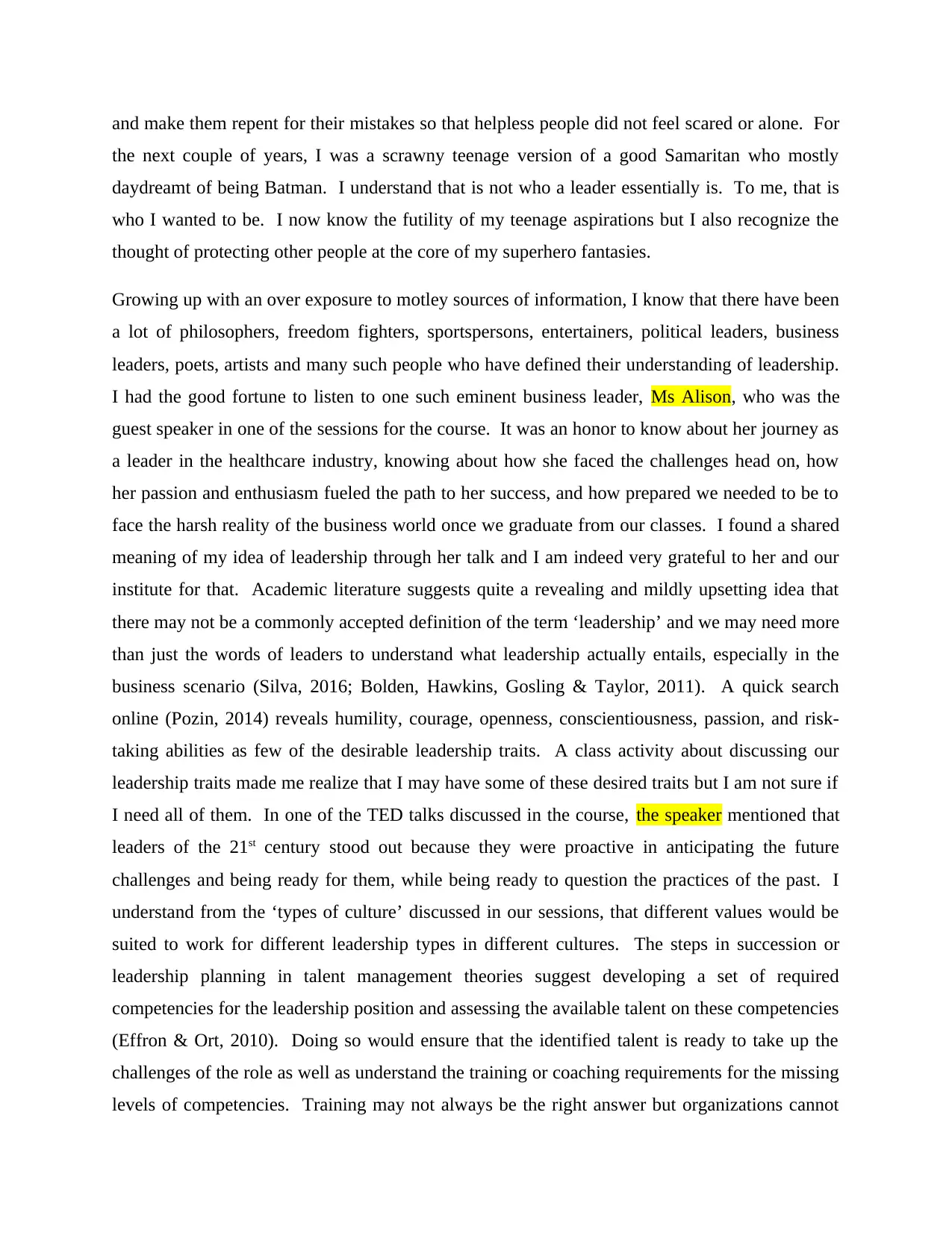
and make them repent for their mistakes so that helpless people did not feel scared or alone. For
the next couple of years, I was a scrawny teenage version of a good Samaritan who mostly
daydreamt of being Batman. I understand that is not who a leader essentially is. To me, that is
who I wanted to be. I now know the futility of my teenage aspirations but I also recognize the
thought of protecting other people at the core of my superhero fantasies.
Growing up with an over exposure to motley sources of information, I know that there have been
a lot of philosophers, freedom fighters, sportspersons, entertainers, political leaders, business
leaders, poets, artists and many such people who have defined their understanding of leadership.
I had the good fortune to listen to one such eminent business leader, Ms Alison, who was the
guest speaker in one of the sessions for the course. It was an honor to know about her journey as
a leader in the healthcare industry, knowing about how she faced the challenges head on, how
her passion and enthusiasm fueled the path to her success, and how prepared we needed to be to
face the harsh reality of the business world once we graduate from our classes. I found a shared
meaning of my idea of leadership through her talk and I am indeed very grateful to her and our
institute for that. Academic literature suggests quite a revealing and mildly upsetting idea that
there may not be a commonly accepted definition of the term ‘leadership’ and we may need more
than just the words of leaders to understand what leadership actually entails, especially in the
business scenario (Silva, 2016; Bolden, Hawkins, Gosling & Taylor, 2011). A quick search
online (Pozin, 2014) reveals humility, courage, openness, conscientiousness, passion, and risk-
taking abilities as few of the desirable leadership traits. A class activity about discussing our
leadership traits made me realize that I may have some of these desired traits but I am not sure if
I need all of them. In one of the TED talks discussed in the course, the speaker mentioned that
leaders of the 21st century stood out because they were proactive in anticipating the future
challenges and being ready for them, while being ready to question the practices of the past. I
understand from the ‘types of culture’ discussed in our sessions, that different values would be
suited to work for different leadership types in different cultures. The steps in succession or
leadership planning in talent management theories suggest developing a set of required
competencies for the leadership position and assessing the available talent on these competencies
(Effron & Ort, 2010). Doing so would ensure that the identified talent is ready to take up the
challenges of the role as well as understand the training or coaching requirements for the missing
levels of competencies. Training may not always be the right answer but organizations cannot
the next couple of years, I was a scrawny teenage version of a good Samaritan who mostly
daydreamt of being Batman. I understand that is not who a leader essentially is. To me, that is
who I wanted to be. I now know the futility of my teenage aspirations but I also recognize the
thought of protecting other people at the core of my superhero fantasies.
Growing up with an over exposure to motley sources of information, I know that there have been
a lot of philosophers, freedom fighters, sportspersons, entertainers, political leaders, business
leaders, poets, artists and many such people who have defined their understanding of leadership.
I had the good fortune to listen to one such eminent business leader, Ms Alison, who was the
guest speaker in one of the sessions for the course. It was an honor to know about her journey as
a leader in the healthcare industry, knowing about how she faced the challenges head on, how
her passion and enthusiasm fueled the path to her success, and how prepared we needed to be to
face the harsh reality of the business world once we graduate from our classes. I found a shared
meaning of my idea of leadership through her talk and I am indeed very grateful to her and our
institute for that. Academic literature suggests quite a revealing and mildly upsetting idea that
there may not be a commonly accepted definition of the term ‘leadership’ and we may need more
than just the words of leaders to understand what leadership actually entails, especially in the
business scenario (Silva, 2016; Bolden, Hawkins, Gosling & Taylor, 2011). A quick search
online (Pozin, 2014) reveals humility, courage, openness, conscientiousness, passion, and risk-
taking abilities as few of the desirable leadership traits. A class activity about discussing our
leadership traits made me realize that I may have some of these desired traits but I am not sure if
I need all of them. In one of the TED talks discussed in the course, the speaker mentioned that
leaders of the 21st century stood out because they were proactive in anticipating the future
challenges and being ready for them, while being ready to question the practices of the past. I
understand from the ‘types of culture’ discussed in our sessions, that different values would be
suited to work for different leadership types in different cultures. The steps in succession or
leadership planning in talent management theories suggest developing a set of required
competencies for the leadership position and assessing the available talent on these competencies
(Effron & Ort, 2010). Doing so would ensure that the identified talent is ready to take up the
challenges of the role as well as understand the training or coaching requirements for the missing
levels of competencies. Training may not always be the right answer but organizations cannot
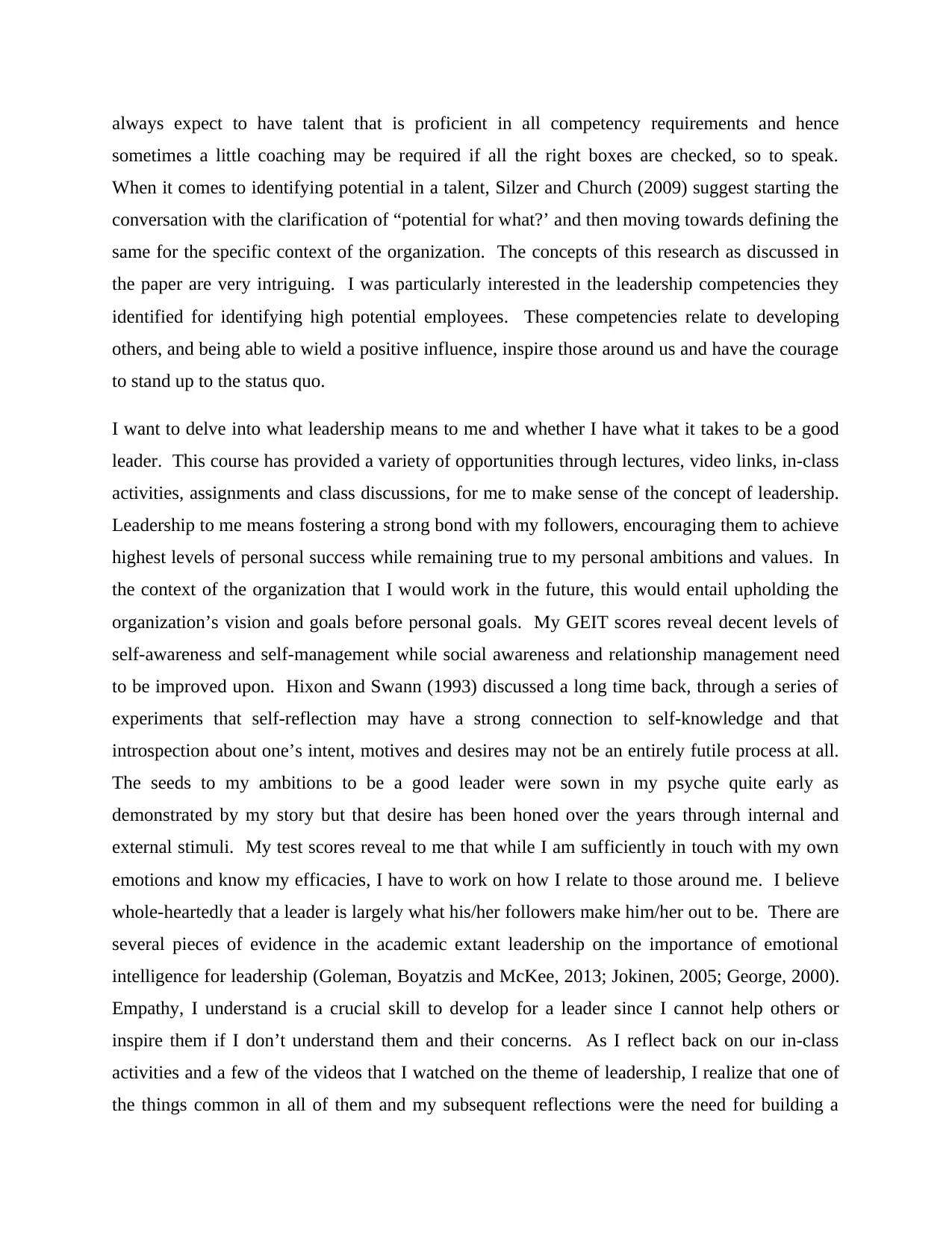
always expect to have talent that is proficient in all competency requirements and hence
sometimes a little coaching may be required if all the right boxes are checked, so to speak.
When it comes to identifying potential in a talent, Silzer and Church (2009) suggest starting the
conversation with the clarification of “potential for what?’ and then moving towards defining the
same for the specific context of the organization. The concepts of this research as discussed in
the paper are very intriguing. I was particularly interested in the leadership competencies they
identified for identifying high potential employees. These competencies relate to developing
others, and being able to wield a positive influence, inspire those around us and have the courage
to stand up to the status quo.
I want to delve into what leadership means to me and whether I have what it takes to be a good
leader. This course has provided a variety of opportunities through lectures, video links, in-class
activities, assignments and class discussions, for me to make sense of the concept of leadership.
Leadership to me means fostering a strong bond with my followers, encouraging them to achieve
highest levels of personal success while remaining true to my personal ambitions and values. In
the context of the organization that I would work in the future, this would entail upholding the
organization’s vision and goals before personal goals. My GEIT scores reveal decent levels of
self-awareness and self-management while social awareness and relationship management need
to be improved upon. Hixon and Swann (1993) discussed a long time back, through a series of
experiments that self-reflection may have a strong connection to self-knowledge and that
introspection about one’s intent, motives and desires may not be an entirely futile process at all.
The seeds to my ambitions to be a good leader were sown in my psyche quite early as
demonstrated by my story but that desire has been honed over the years through internal and
external stimuli. My test scores reveal to me that while I am sufficiently in touch with my own
emotions and know my efficacies, I have to work on how I relate to those around me. I believe
whole-heartedly that a leader is largely what his/her followers make him/her out to be. There are
several pieces of evidence in the academic extant leadership on the importance of emotional
intelligence for leadership (Goleman, Boyatzis and McKee, 2013; Jokinen, 2005; George, 2000).
Empathy, I understand is a crucial skill to develop for a leader since I cannot help others or
inspire them if I don’t understand them and their concerns. As I reflect back on our in-class
activities and a few of the videos that I watched on the theme of leadership, I realize that one of
the things common in all of them and my subsequent reflections were the need for building a
sometimes a little coaching may be required if all the right boxes are checked, so to speak.
When it comes to identifying potential in a talent, Silzer and Church (2009) suggest starting the
conversation with the clarification of “potential for what?’ and then moving towards defining the
same for the specific context of the organization. The concepts of this research as discussed in
the paper are very intriguing. I was particularly interested in the leadership competencies they
identified for identifying high potential employees. These competencies relate to developing
others, and being able to wield a positive influence, inspire those around us and have the courage
to stand up to the status quo.
I want to delve into what leadership means to me and whether I have what it takes to be a good
leader. This course has provided a variety of opportunities through lectures, video links, in-class
activities, assignments and class discussions, for me to make sense of the concept of leadership.
Leadership to me means fostering a strong bond with my followers, encouraging them to achieve
highest levels of personal success while remaining true to my personal ambitions and values. In
the context of the organization that I would work in the future, this would entail upholding the
organization’s vision and goals before personal goals. My GEIT scores reveal decent levels of
self-awareness and self-management while social awareness and relationship management need
to be improved upon. Hixon and Swann (1993) discussed a long time back, through a series of
experiments that self-reflection may have a strong connection to self-knowledge and that
introspection about one’s intent, motives and desires may not be an entirely futile process at all.
The seeds to my ambitions to be a good leader were sown in my psyche quite early as
demonstrated by my story but that desire has been honed over the years through internal and
external stimuli. My test scores reveal to me that while I am sufficiently in touch with my own
emotions and know my efficacies, I have to work on how I relate to those around me. I believe
whole-heartedly that a leader is largely what his/her followers make him/her out to be. There are
several pieces of evidence in the academic extant leadership on the importance of emotional
intelligence for leadership (Goleman, Boyatzis and McKee, 2013; Jokinen, 2005; George, 2000).
Empathy, I understand is a crucial skill to develop for a leader since I cannot help others or
inspire them if I don’t understand them and their concerns. As I reflect back on our in-class
activities and a few of the videos that I watched on the theme of leadership, I realize that one of
the things common in all of them and my subsequent reflections were the need for building a
⊘ This is a preview!⊘
Do you want full access?
Subscribe today to unlock all pages.

Trusted by 1+ million students worldwide
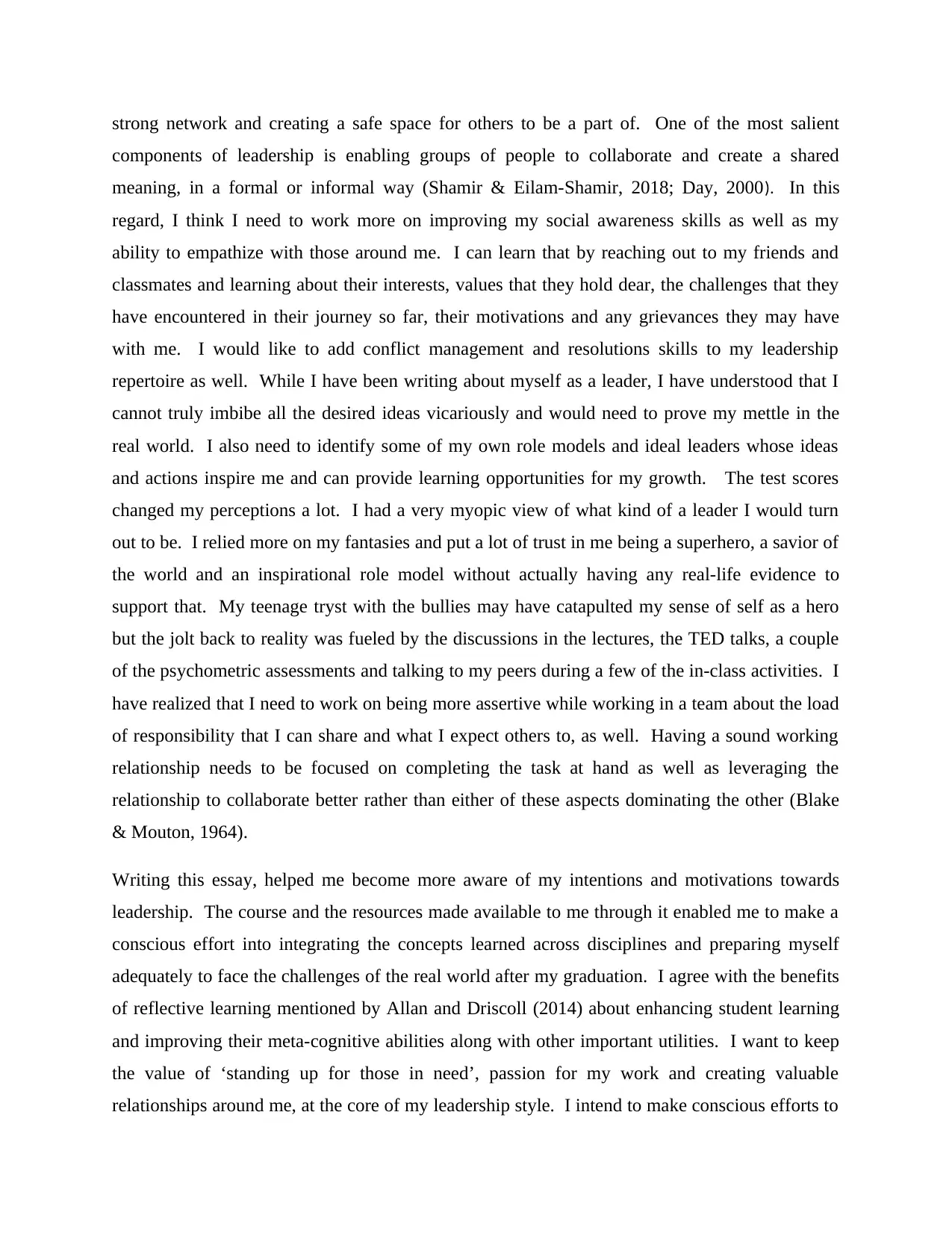
strong network and creating a safe space for others to be a part of. One of the most salient
components of leadership is enabling groups of people to collaborate and create a shared
meaning, in a formal or informal way (Shamir & Eilam-Shamir, 2018; Day, 2000). In this
regard, I think I need to work more on improving my social awareness skills as well as my
ability to empathize with those around me. I can learn that by reaching out to my friends and
classmates and learning about their interests, values that they hold dear, the challenges that they
have encountered in their journey so far, their motivations and any grievances they may have
with me. I would like to add conflict management and resolutions skills to my leadership
repertoire as well. While I have been writing about myself as a leader, I have understood that I
cannot truly imbibe all the desired ideas vicariously and would need to prove my mettle in the
real world. I also need to identify some of my own role models and ideal leaders whose ideas
and actions inspire me and can provide learning opportunities for my growth. The test scores
changed my perceptions a lot. I had a very myopic view of what kind of a leader I would turn
out to be. I relied more on my fantasies and put a lot of trust in me being a superhero, a savior of
the world and an inspirational role model without actually having any real-life evidence to
support that. My teenage tryst with the bullies may have catapulted my sense of self as a hero
but the jolt back to reality was fueled by the discussions in the lectures, the TED talks, a couple
of the psychometric assessments and talking to my peers during a few of the in-class activities. I
have realized that I need to work on being more assertive while working in a team about the load
of responsibility that I can share and what I expect others to, as well. Having a sound working
relationship needs to be focused on completing the task at hand as well as leveraging the
relationship to collaborate better rather than either of these aspects dominating the other (Blake
& Mouton, 1964).
Writing this essay, helped me become more aware of my intentions and motivations towards
leadership. The course and the resources made available to me through it enabled me to make a
conscious effort into integrating the concepts learned across disciplines and preparing myself
adequately to face the challenges of the real world after my graduation. I agree with the benefits
of reflective learning mentioned by Allan and Driscoll (2014) about enhancing student learning
and improving their meta-cognitive abilities along with other important utilities. I want to keep
the value of ‘standing up for those in need’, passion for my work and creating valuable
relationships around me, at the core of my leadership style. I intend to make conscious efforts to
components of leadership is enabling groups of people to collaborate and create a shared
meaning, in a formal or informal way (Shamir & Eilam-Shamir, 2018; Day, 2000). In this
regard, I think I need to work more on improving my social awareness skills as well as my
ability to empathize with those around me. I can learn that by reaching out to my friends and
classmates and learning about their interests, values that they hold dear, the challenges that they
have encountered in their journey so far, their motivations and any grievances they may have
with me. I would like to add conflict management and resolutions skills to my leadership
repertoire as well. While I have been writing about myself as a leader, I have understood that I
cannot truly imbibe all the desired ideas vicariously and would need to prove my mettle in the
real world. I also need to identify some of my own role models and ideal leaders whose ideas
and actions inspire me and can provide learning opportunities for my growth. The test scores
changed my perceptions a lot. I had a very myopic view of what kind of a leader I would turn
out to be. I relied more on my fantasies and put a lot of trust in me being a superhero, a savior of
the world and an inspirational role model without actually having any real-life evidence to
support that. My teenage tryst with the bullies may have catapulted my sense of self as a hero
but the jolt back to reality was fueled by the discussions in the lectures, the TED talks, a couple
of the psychometric assessments and talking to my peers during a few of the in-class activities. I
have realized that I need to work on being more assertive while working in a team about the load
of responsibility that I can share and what I expect others to, as well. Having a sound working
relationship needs to be focused on completing the task at hand as well as leveraging the
relationship to collaborate better rather than either of these aspects dominating the other (Blake
& Mouton, 1964).
Writing this essay, helped me become more aware of my intentions and motivations towards
leadership. The course and the resources made available to me through it enabled me to make a
conscious effort into integrating the concepts learned across disciplines and preparing myself
adequately to face the challenges of the real world after my graduation. I agree with the benefits
of reflective learning mentioned by Allan and Driscoll (2014) about enhancing student learning
and improving their meta-cognitive abilities along with other important utilities. I want to keep
the value of ‘standing up for those in need’, passion for my work and creating valuable
relationships around me, at the core of my leadership style. I intend to make conscious efforts to
Paraphrase This Document
Need a fresh take? Get an instant paraphrase of this document with our AI Paraphraser
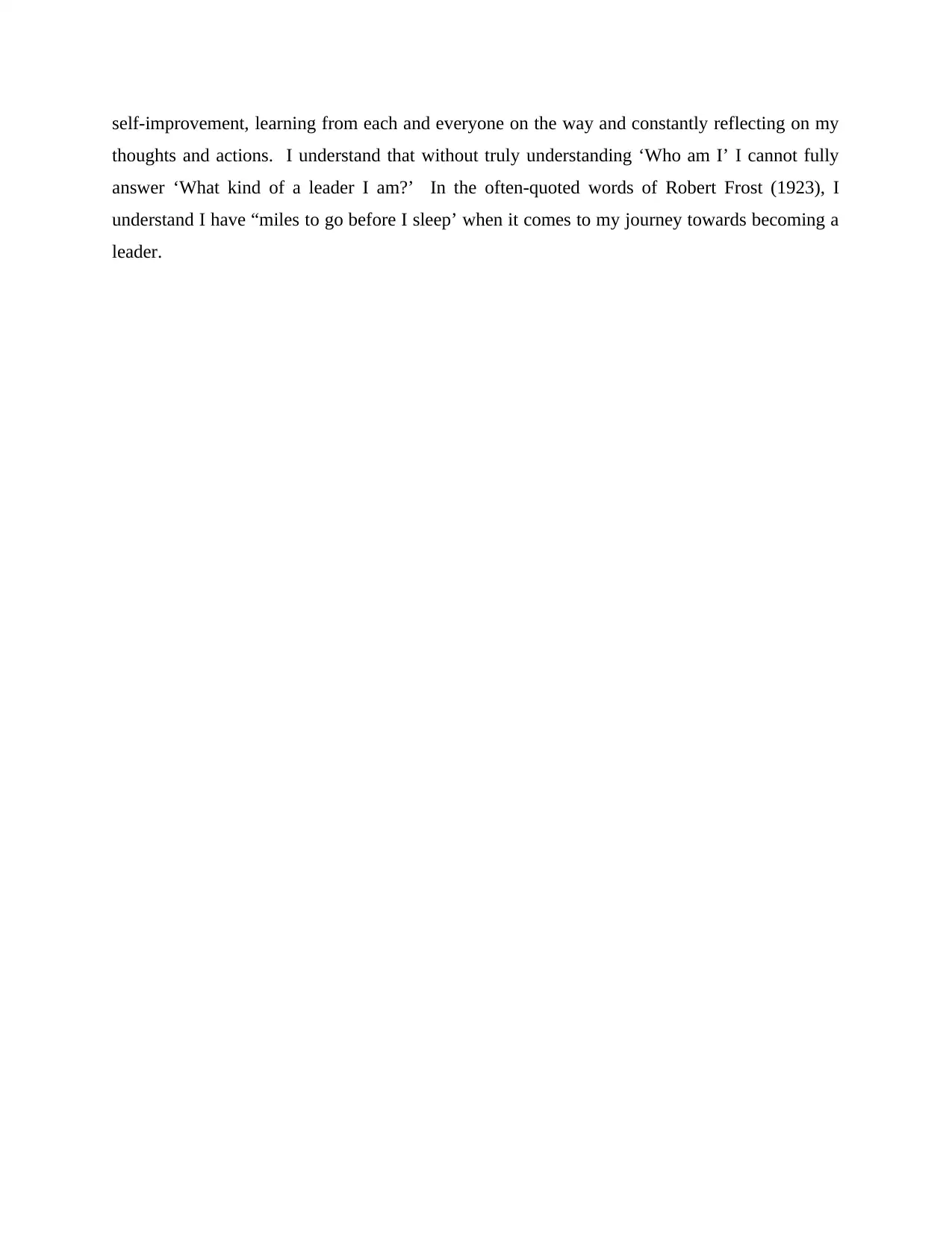
self-improvement, learning from each and everyone on the way and constantly reflecting on my
thoughts and actions. I understand that without truly understanding ‘Who am I’ I cannot fully
answer ‘What kind of a leader I am?’ In the often-quoted words of Robert Frost (1923), I
understand I have “miles to go before I sleep’ when it comes to my journey towards becoming a
leader.
thoughts and actions. I understand that without truly understanding ‘Who am I’ I cannot fully
answer ‘What kind of a leader I am?’ In the often-quoted words of Robert Frost (1923), I
understand I have “miles to go before I sleep’ when it comes to my journey towards becoming a
leader.
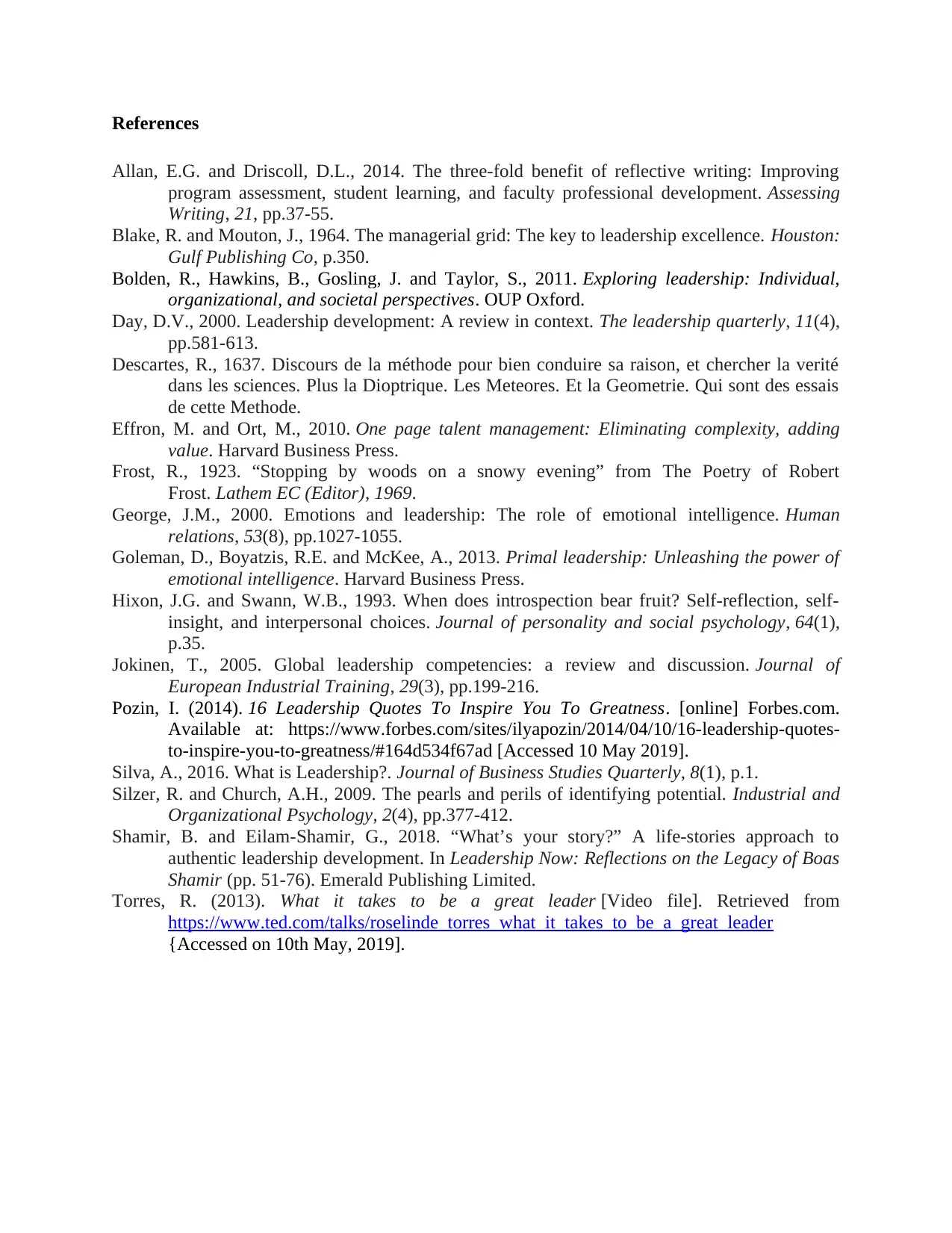
References
Allan, E.G. and Driscoll, D.L., 2014. The three-fold benefit of reflective writing: Improving
program assessment, student learning, and faculty professional development. Assessing
Writing, 21, pp.37-55.
Blake, R. and Mouton, J., 1964. The managerial grid: The key to leadership excellence. Houston:
Gulf Publishing Co, p.350.
Bolden, R., Hawkins, B., Gosling, J. and Taylor, S., 2011. Exploring leadership: Individual,
organizational, and societal perspectives. OUP Oxford.
Day, D.V., 2000. Leadership development: A review in context. The leadership quarterly, 11(4),
pp.581-613.
Descartes, R., 1637. Discours de la méthode pour bien conduire sa raison, et chercher la verité
dans les sciences. Plus la Dioptrique. Les Meteores. Et la Geometrie. Qui sont des essais
de cette Methode.
Effron, M. and Ort, M., 2010. One page talent management: Eliminating complexity, adding
value. Harvard Business Press.
Frost, R., 1923. “Stopping by woods on a snowy evening” from The Poetry of Robert
Frost. Lathem EC (Editor), 1969.
George, J.M., 2000. Emotions and leadership: The role of emotional intelligence. Human
relations, 53(8), pp.1027-1055.
Goleman, D., Boyatzis, R.E. and McKee, A., 2013. Primal leadership: Unleashing the power of
emotional intelligence. Harvard Business Press.
Hixon, J.G. and Swann, W.B., 1993. When does introspection bear fruit? Self-reflection, self-
insight, and interpersonal choices. Journal of personality and social psychology, 64(1),
p.35.
Jokinen, T., 2005. Global leadership competencies: a review and discussion. Journal of
European Industrial Training, 29(3), pp.199-216.
Pozin, I. (2014). 16 Leadership Quotes To Inspire You To Greatness. [online] Forbes.com.
Available at: https://www.forbes.com/sites/ilyapozin/2014/04/10/16-leadership-quotes-
to-inspire-you-to-greatness/#164d534f67ad [Accessed 10 May 2019].
Silva, A., 2016. What is Leadership?. Journal of Business Studies Quarterly, 8(1), p.1.
Silzer, R. and Church, A.H., 2009. The pearls and perils of identifying potential. Industrial and
Organizational Psychology, 2(4), pp.377-412.
Shamir, B. and Eilam-Shamir, G., 2018. “What’s your story?” A life-stories approach to
authentic leadership development. In Leadership Now: Reflections on the Legacy of Boas
Shamir (pp. 51-76). Emerald Publishing Limited.
Torres, R. (2013). What it takes to be a great leader [Video file]. Retrieved from
https://www.ted.com/talks/roselinde_torres_what_it_takes_to_be_a_great_leader
{Accessed on 10th May, 2019].
Allan, E.G. and Driscoll, D.L., 2014. The three-fold benefit of reflective writing: Improving
program assessment, student learning, and faculty professional development. Assessing
Writing, 21, pp.37-55.
Blake, R. and Mouton, J., 1964. The managerial grid: The key to leadership excellence. Houston:
Gulf Publishing Co, p.350.
Bolden, R., Hawkins, B., Gosling, J. and Taylor, S., 2011. Exploring leadership: Individual,
organizational, and societal perspectives. OUP Oxford.
Day, D.V., 2000. Leadership development: A review in context. The leadership quarterly, 11(4),
pp.581-613.
Descartes, R., 1637. Discours de la méthode pour bien conduire sa raison, et chercher la verité
dans les sciences. Plus la Dioptrique. Les Meteores. Et la Geometrie. Qui sont des essais
de cette Methode.
Effron, M. and Ort, M., 2010. One page talent management: Eliminating complexity, adding
value. Harvard Business Press.
Frost, R., 1923. “Stopping by woods on a snowy evening” from The Poetry of Robert
Frost. Lathem EC (Editor), 1969.
George, J.M., 2000. Emotions and leadership: The role of emotional intelligence. Human
relations, 53(8), pp.1027-1055.
Goleman, D., Boyatzis, R.E. and McKee, A., 2013. Primal leadership: Unleashing the power of
emotional intelligence. Harvard Business Press.
Hixon, J.G. and Swann, W.B., 1993. When does introspection bear fruit? Self-reflection, self-
insight, and interpersonal choices. Journal of personality and social psychology, 64(1),
p.35.
Jokinen, T., 2005. Global leadership competencies: a review and discussion. Journal of
European Industrial Training, 29(3), pp.199-216.
Pozin, I. (2014). 16 Leadership Quotes To Inspire You To Greatness. [online] Forbes.com.
Available at: https://www.forbes.com/sites/ilyapozin/2014/04/10/16-leadership-quotes-
to-inspire-you-to-greatness/#164d534f67ad [Accessed 10 May 2019].
Silva, A., 2016. What is Leadership?. Journal of Business Studies Quarterly, 8(1), p.1.
Silzer, R. and Church, A.H., 2009. The pearls and perils of identifying potential. Industrial and
Organizational Psychology, 2(4), pp.377-412.
Shamir, B. and Eilam-Shamir, G., 2018. “What’s your story?” A life-stories approach to
authentic leadership development. In Leadership Now: Reflections on the Legacy of Boas
Shamir (pp. 51-76). Emerald Publishing Limited.
Torres, R. (2013). What it takes to be a great leader [Video file]. Retrieved from
https://www.ted.com/talks/roselinde_torres_what_it_takes_to_be_a_great_leader
{Accessed on 10th May, 2019].
⊘ This is a preview!⊘
Do you want full access?
Subscribe today to unlock all pages.

Trusted by 1+ million students worldwide
1 out of 6
Related Documents
Your All-in-One AI-Powered Toolkit for Academic Success.
+13062052269
info@desklib.com
Available 24*7 on WhatsApp / Email
![[object Object]](/_next/static/media/star-bottom.7253800d.svg)
Unlock your academic potential
Copyright © 2020–2025 A2Z Services. All Rights Reserved. Developed and managed by ZUCOL.





